|
|
|
Sort Order |
|
|
|
Items / Page
|
|
|
|
|
|
|
| Srl | Item |
| 1 |
ID:
138124
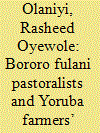

|
|
|
|
|
| Summary/Abstract |
This article, based on in-depth oral interviews, focuses on the conflicts between Bororo Fulani pastoralists and Yoruba farmers in Saki and Iseyin towns of the Upper Ogun River (Oke-Ogun), Oyo State Nigeria to show the power disparity and competition over land resources. The conflicts that occurred between Bororo Fulani pastoralists and Yoruba farmers are classified as: economic (crop destruction and cattle killing); social (murder, rape, armed banditry, molestation on both sides of the conflict); and communal (large-scale destruction of villages, pastoral settlements and markets). Other conflicts involved access to grazing and water resources and access to markets. These conflicts were products of resource scarcity and broader challenges of power relations between indigenes and settlers/migrants in Nigeria. Ethnicity became more conspicuous among local people as these conflicts intensified. This article discusses the intervention of Yoruba traditional rulers (Oba) and Fulani headman (Ardo) in the formation of peace committees in Iseyin and Saki towns.
|
|
|
|
|
|
|
|
|
|
|
|
|
|
|
|
| 2 |
ID:
138120


|
|
|
|
|
| Summary/Abstract |
This paper argues that policy space ownership dynamics, political and historical institutional variables determine the implementation of reforms advocated within the context of the international transfer of public sector reform models to Africa. Through the case of the Malawi Hospital Autonomy reforms, this paper demonstrates that although policies transferred by international donor organisations to African countries through aid conditionality may be initially adopted so as to secure the much-needed developmental aid, the actual implementation of such reforms is not an automatic process. This is due to contextual factors, which in part include the neo-colonial struggle for policy ownership in the face of conditionality, path dependency tendencies and veto players that are constrained by deeply entrenched political and historical institutional proclivity that lead to policy stability even in the context of coercive policy transfer pressures. Taking a qualitative approach, the analysis combines the use of primary and secondary data. The study findings show that while other African countries successfully implemented such reforms, Malawi has not, due to specific implementation, historical, political and institutional factors.
|
|
|
|
|
|
|
|
|
|
|
|
|
|
|
|
| 3 |
ID:
138119


|
|
|
|
|
| Summary/Abstract |
This study focused on the experiences of a principal in developing a collaborative practice for teachers in his school. A qualitative research design was employed to determine the views of the principal in initiating and maintaining a collaborative culture in the primary school. A narrative analysis was used to analyse the data. The findings show the necessity of supportive leadership, how important it is for teachers to share their intellectual property and the benefit of creating supportive conditions for teacher collaboration. The study provides a tentative theoretical framework for a better understanding of the role of leadership in teacher collaboration and suggestions for teachers who would like to develop practical learning communities in their schools.
|
|
|
|
|
|
|
|
|
|
|
|
|
|
|
|
| 4 |
ID:
138118
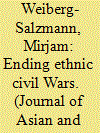

|
|
|
|
|
| Summary/Abstract |
At the beginning of 21st century (ethnic) civil wars have been proliferate all over the world. Many ethnic conflicts – for example the conflict in Sri Lankan between the Sinhalese majority government and the guerrilla fighters of the Tamil minority – are characterized by constant efforts for conflict resolution interspersed with renewed violence, with cycles of military escalation and de-escalation. Also, they are marked by the helplessness of the international actors, who profess their interest in a resolution and try to mediate between the contending parties. But they are rarely successful – why? I assume that the most important question in war and peacetime is whether security is possible to achieve to prevent the security dilemma escalating. In many Asian and African countries people perceive politics and security in ethnic terms. Thus how a party defines security is of decisive importance concerning whether a conflict can end in peace or will be solved militarily. Within an exclusive security concept, security can only persist if the other is annihilated or oppressed by military means, while inclusive security concepts can achieve security by special arrangements, peace agreements or security guarantees. Third parties, who are engaged in mediating violent conflicts, have to keep in mind that it is the elusive balance of these security schemes which determine successful negotiations and at least a permanent solution. To reach a lasting peace it is not sufficient for external actors to provide security; in the long run, they must transform exclusive into inclusive security concepts.
|
|
|
|
|
|
|
|
|
|
|
|
|
|
|
|
| 5 |
ID:
138123
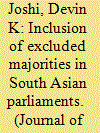

|
|
|
|
|
| Summary/Abstract |
This article provides a new perspective on parliamentary representation in South Asia, focusing on the collective under-representation of population majorities based on the macro-demographic categories of age, class, and gender. Situating this analysis within debates on descriptive representation, it presents the first comparative analysis of the contemporary demographic characteristics of members of parliament (MPs) in Bangladesh, Bhutan, India, Nepal, Pakistan, and Sri Lanka. Highlighting three major gaps in parliamentary representation, it finds quotas, proportional representation electoral systems, and leftist parties to have positively impacted the descriptive representation of South Asian women, the working class, and young adults.
|
|
|
|
|
|
|
|
|
|
|
|
|
|
|
|
| 6 |
ID:
138122
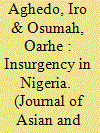

|
|
|
|
|
| Summary/Abstract |
The Niger Delta militancy and Boko Haram insurgency pose the greatest security threat to Nigeria since the end of the civil war in 1970. This article places both rebellions in comparative perspective. It argues that, though spatially and ideologically differentiated, both insurgencies are products of the dysfunctional character of the Nigerian state. Owing to poor governance, the state relies essentially on repression and the military option in managing challenges to its legitimacy, leading to the radicalization of violent non-state actors. The article recommends the need for developmental politics and a critical re-examination of the National Question to make the state more relevant to the people.
|
|
|
|
|
|
|
|
|
|
|
|
|
|
|
|
| 7 |
ID:
138121
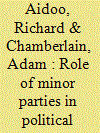

|
|
|
|
|
| Summary/Abstract |
The study of minor parties has largely focused on well-established democracies, even though these political organizations play significant roles in new and emerging democracies. With Ghana as a case study, this investigation provides a theoretical path to understanding the normative role of minor parties in political competition, especially in developing nations with single-member plurality systems. By placing emphasis on the experiences of such parties in Ghana’s 2012 elections in the Fourth Republican dispensation, this article examines the value and importance of minor parties in helping to create and maintain stable democracies. In spite of the recognizable obstacles minor parties face, we argue that they nevertheless contribute to the health of a burgeoning democratic culture.
|
|
|
|
|
|
|
|
|
|
|
|
|
|
|
|
|
|
|
|
|